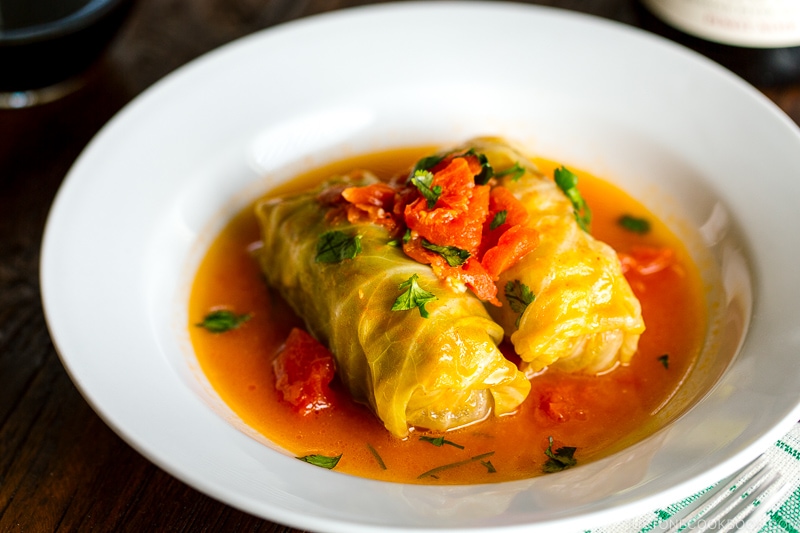Japanese Stuffed Cabbage Rolls
4.6
(29)
Your folders
Your folders
Prep Time: 30 minutes
Cook Time: 60 minutes
Total: 90 minutes
Servings: 4
Author : Nami

Ingredients
Export 15 ingredients for grocery delivery
Instructions
Step 1
Gather all the ingredients.
Step 2
Mince the onion. With the knife tip pointing toward the root, thinly slice the onion within ½ inch off the base. Then slice the onion horizontally.
Step 3
Then cut perpendicular to the first slices you made. If the onions need to be chopped finer, you can run your knife through them in a rocking motion.
Step 4
In a frying pan, heat 1 Tbsp olive oil on medium heat and sauté onion until tender, about 4 to 6 minutes.
Step 5
Start boiling 2 QT (2L) water and add 1 tsp salt when boiling. Remove the center core of the cabbage with a knife.
Step 6
Completely submerge the whole cabbage and cook the cabbage until the leaves are pliable and started to peel off, about 5 minutes. Using kitchen tongs or a fork, peel off and take out loosen outer cabbage leaves from the pot.
Step 7
Soak the cabbage leaves in iced water to stop the cooking process. Remove excess water from them with a salad spinner or pat dry with paper towel. Trim the tough, thick center vein at the base of each leaf (upside-down V shape). Alternatively, you can shave down this thick part. For a beginner cook, I recommend simply cutting it off.
Step 8
Chop the thick veins into small pieces, which will be added to the stuffing.
Step 9
In a large bowl, mix the meat, sautéed onion, and the chopped vein parts of the cabbage with your clean hands or a rubber spatula.
Step 10
Add 1 egg, ⅓ cup panko, 2 Tbsp milk, ½ tsp nutmeg, 1 tsp salt, and pepper.
Step 11
Mix well until the mixture is sticky and combined. Cover with plastic wrap and keep in the refrigerator for 15-30 minutes (this step is optional; however, it helps to solidify fat, keep the meat juicy and prevent from drying out, and enhance and trap the umami flavor).
Step 12
Try to divide the mixture into 12 equal parts (I roughly divided into 8 first and adjusted the amounts later).
Step 13
Put 1 Tbsp of the flour into a fine sieve for dusting. Working with 1 leaf at a time, overlap the bottom of the cabbage leaf where you see the upside-down V-shape. Lightly dust the flour over the cabbage leaf. The flour helps the stuffing stick to the cabbage and acts as a binding agent. Add the stuffing in the center of the bottom part of the cabbage leaf.
Step 14
Starting with the stem end, roll the cabbage up tightly, tucking in the sides of the leaf as you roll.
Step 15
Use one hand to pull the edge of the leaf and roll the fillings tightly toward the edge.
Step 16
Insert a toothpick to seal and secure the edge so the roll doesn’t fall apart while cooking (optional). Repeat with the remaining leaves and stuffing.
Step 17
What if the cabbage leaf is broken? You can still use it. Use a smaller cabbage leaf to “patch” up and roll the fillings the same way.
Step 18
In a large pot (I use 6 ¾ QT oval Dutch oven), heat 1 Tbsp olive oil on medium heat and cook 2 bay leaves and minced garlic until fragrant. Then stir in the diced tomatoes.
Step 19
Reduce the heat to medium-low. Add 1 Tbsp white wine, salt, and freshly ground black pepper, and bring it to simmer on medium heat.
Step 20
Place the cabbage rolls side by side in rows, seam side down, in the pot. If there are open spaces, stuff the leftover cabbage in the opening so the cabbage rolls won’t move around while cooking. Pour 1 cup of chicken/vegetable broth.
Step 21
Place Otoshibuta (drop lid) on top of the cabbage rolls. If you don’t have a drop lid or your pot is not round, you can make it with aluminum foil (see the tutorial here). Cover to cook on medium heat. After boiling, lower the heat to medium-low heat and simmer for 30 minutes. Add ½ Tbsp butter to give it a little shine and more flavor.
Step 22
When you are ready to serve, carefully pick up the stuffed cabbage roll with kitchen tongs and put in a serving dish. Remove the toothpick and pour the sauce on top. Garnish with parsley and serve.